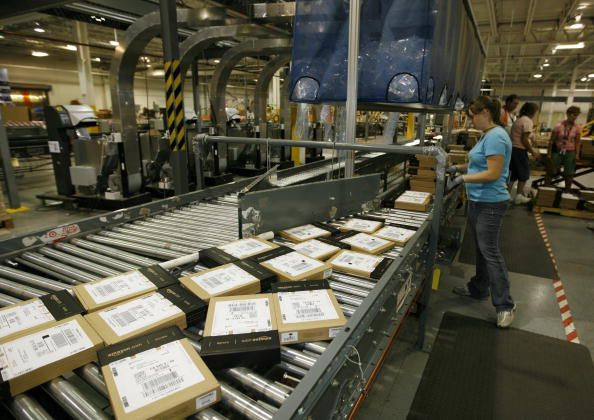Amazon SKU Limits On Novelty Items Devastate Some Longtime Sellers

Entrepreneurs who have built their livelihoods around the massive retail ecosphere that is Amazon.com Inc. (NASDAQ: AMZN) are once again being reminded who's running the show.
According to a number of third-party Amazon merchants, a recent change that limits the amount of items they’re allowed to sell on the Amazon Marketplace is going to devastate their bottom lines. Last month, the Seattle-based retail giant began informing some merchants that SKU caps are being imposed on “novelty” items, a broad category that can include anything from T-shirts to gag toys. In some cases, sellers say they are being limited to 100,000 items; in other cases the limit is said to be as low as 25,000 items. Some longtime marketplace sellers say the abrupt cap is a strange way for Amazon to show its appreciation for their loyalty to its platform.
“We have built our family business solely on Amazon, but this pretty much means the end,” said one frustrated seller, who asked not to be identified because of ongoing efforts to convince Amazon to reverse the decision. “There are many merchants affected the same way that we are, and it looks like merchants are getting extremely desperate. Many companies, including mine, had to lay off people.”
Other sellers have been grumbling about the change on message boards and chat rooms, saying they are now being forced to manually reduce the number of items in their inventory or risk having their accounts shut down. They say news of the change came in a comply-or-else email offering no recourse for appeal. Amazon, conversely, said it always gives advance notice of such changes and, in fact, sent numerous reminders to sellers.
Erik Fairleigh, a representative for Amazon, referred International Business Times to a help page explaining the change but didn't respond to questions seeking additional information about why the policy is being instituted now and how Amazon decides which accounts are affected. According to the help page, the change is an effort to reduce clutter and help customers find novelty items more easily:
“For sellers who list a large number of novelty SKUs or SKUs that are similar to each other and which have not received customer interest, Amazon has instituted SKU limits. Sellers who are impacted by these limits are contacted by Amazon and expected to actively reduce their number of ASINs [Amazon Standard Identification Numbers] below their limit. Sellers who fail to do so within the allotted time may have their accounts suspended.”
Posting on the Amazon UK “Seller Central” message board, one merchant wrote that the need to reduce the flood of inferior products is understandable, but that Amazon has essentially “thrown the proverbial baby out with the bath water” by arbitrarily limiting sellers’ ability to diversify and expand their inventory. “[W]e were not harming or clogging the search system for anyone,” the merchant wrote. “And yet, we will lose sales, Amazon will lose fees, and the customer will lose the opportunity to purchase a unique item. I am still in shock that Amazon would act so draconically, and so suddenly.”
Some sellers who sell novelty clothing items say they feel the change unfairly targets their inventory, which can include numerous SKUs per design when different sizes and colors are accounted for. “Going to cause a massive headache for us,” one seller wrote.”
The Seattle Times reported in January that Amazon’s more than two million Marketplace sellers generate “tens of billions of dollars” and account for about 10 to 15 percent of its total revenue. As of last year, third-party sellers accounted for about 40 percent of products sold through Amazon.com. Many of those sellers are entrepreneurs who have spent years growing and maintaining their inventories. Others are reluctant competitors whose brick-and-mortar businesses have been squeezed by online commerce to the point where selling on Amazon is the only alternative.
Merchants often express frustration over being at the whims of a company that, according to its own terms, can pull the rug out from under them, without warning, at its “sole discretion.” A class-action lawsuit was filed last March in behalf of Amazon sellers who claim that the company unlawfully withheld their payments as it investigated their accounts, and in some cases closed them without explanation.
One merchant affected by the new SKU limits said in an email that feudal-like reality is now becoming all too apparent. “What can we do?” the merchant wrote. “We are a little family business up against the giant.”
Correction: An earlier version of this story said word of the SKU limit came without warning, as was the perception of some of the sellers. Amazon, however, said it always gives sellers advance notice of such changes and, in fact, send numerous emails to remind them that it was coming.
Got a news tip? Email me. Follow me on Twitter @christopherzara
© Copyright IBTimes 2024. All rights reserved.





















